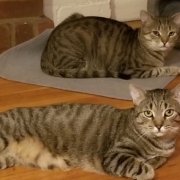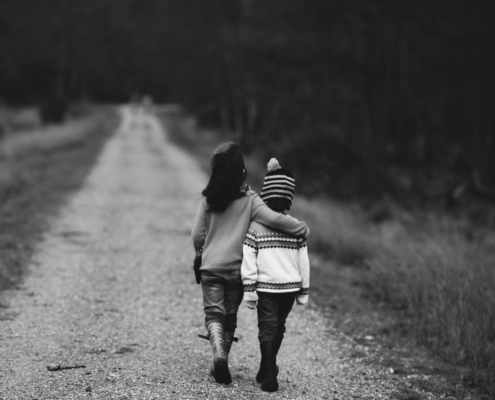The healing power of relationship

Bill and Ted are the cutest!
Recently, my household welcomed two new cats – Bill and Ted (excellent, right?). These little cuddlers are brothers who were rescues from the ASPCA. There was no doubt as to their intense trauma history, though I’ll spare you the details. What was surprising was how quickly they both started to recover, grow, and thrive. My observations led me to conclude that there was only one reason why they demonstrated such incredible resilience: their relationship.
They had each other. They were bonded from birth, and together they could withstand almost anything.
Watching how they soothed and nurtured each other, how they both were so attuned and aware of the other, and how they could play no matter how hurt they’d been was a lesson in the power of relationship. It was so very clear just how much we can learn from animals.
We are not robots. We are a social species that needs contact in order to heal, grow, and thrive. We need each other for survival.
‘Tis the season
Our health and well-being rely on relationships more than just about anything. During the holiday season, the need for connection and love can become even more clear, for better or worse.
Everywhere any of us turn, there are advertisements, flyers, and overheard talk of the importance of family and friends during this festive time of year. There are parties and gatherings, tear-jerking movies, and glowing trees. Stores and restaurants are closed, offices run empty, and children gleefully run through the streets celebrating their break from the tortures of school.
For those without family or intimate friends, this can feel like being punched in the gut over and over and over again, to no avail.
The loneliness epidemic
Loneliness has become a true epidemic in the West, and, particularly, in the United States.
People who feel lonely are up to 32% more likely to die early. Loneliness is so dangerous that it is equivalent to smoking almost a pack a day. And, at least half of us are feeling this way.
Sadly, biotechnology is replacing human interaction. Increasing claims are being made that this is all we need to heal feelings of depression or problems of substance abuse. However, such claims rely upon an assumption that our emotional pain is due to a problem that lies within, rather than between, us.
Mental suffering is rarely the result of faulty brains or personalities. Rather, it is more often the result of the interpersonal wounds we carry with us (and sometimes continue to play out in the present). Certainly, it is not helpful to further alienate those in pain by sending the message that they need to be ‘fixed’ or figure out their issues on their own. Healing requires nurturance.
No matter how advanced our technology becomes, it will never be able to nurture us in the way we truly need. My cat might enjoy a motorized mouse, but that will not feed him. And, it certainly won’t replace the wrestling partner he has in his brother or the warmth of his brother’s tongue while grooming. Plus, I’m sure it just tastes disgusting.
Coping
When family does not provide the nurturance and support we need, it must be found somewhere. The conundrum, of course, is that in order to take in love and support from others, we must be open to it. There must be some belief that it is deserved. Otherwise, it frequently gets ignored, dismissed, or minimized, if it even comes at all. This is when one tends to resort to filling the gaping hole that is left with substances, material goods, self-harm, or worse.
Therapy can help with this, at least when there is value given to the healing power of the therapeutic relationship. But, so, too, can a phone call to an old friend. A teacher or boss who takes a special interest. Even just a pleasant conversation with a cashier. Oh, and pets, of course.
There are also a number of strategies and coping tools one can use to get through periods of time (like the blasted holidays) when loneliness creeps in.
Coping and superficial human interaction can only get us so far, however. As a society, we need to remind ourselves of the importance of us. Of community and intimate bonding. We need to learn how to connect, be vulnerable, and love openly and freely. We need to find compassion and empathy for our neighbors and foes alike. Most animals know how to do this instinctively. Sadly, most humans do not.
People are crying out constantly for connection, yet everyone just keeps swiping left.
Returning to our animal roots
We have moved perhaps too far away from our animal instincts. Technical and medical advancements will be nothing if we don’t have us.
A healthy, supportive relationship might be the single most important medicine any of us has. Take it from Bill and Ted – a loving bond can help us heal from almost anything.


 Photo by Darren Halstead on Unsplash
Photo by Darren Halstead on Unsplash
Nice blog, but I wish you’d cite evidence for your claims. I came across your name in a BBC story about how humans benefit more from therapy by humans as opposed to bots. But there was no evidence for this, it seemed just your gut feeling. Psychologists should, as much as possible, use scientific studies to back up claims like this. If not, or even if it’s based on your clinical experience, it falls into an educated anecdote. Surely we as psychologists can do better than that.
Hi – thanks for reading and your comment. True, this is not an academic article nor is it intended to be. Though, there are several links to outside studies and my own articles that are much more heavily cited. This is clearly an observatory blog piece, not claiming to be academic. Having said that, I find it sad that we need research to back up a claim that relationships are important and matter. Surely, we as psychologists can do better than that.